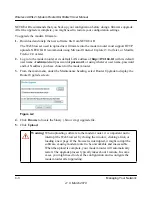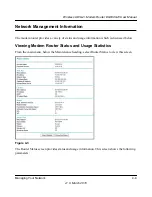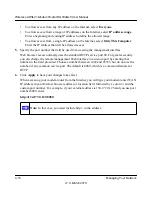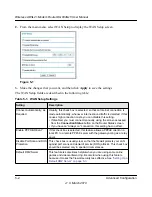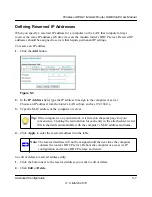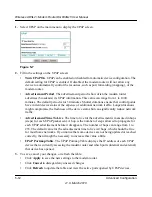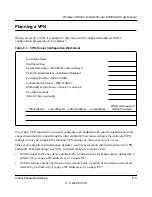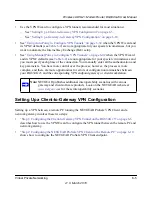
Wireless ADSL2+ Modem Router DG834Gv5 User Manual
Advanced Configuration
5-3
v1.0, March 2010
Setting Up a Default DMZ Server
The default DMZ server feature is helpful when you are using some online games and
videoconferencing applications that are incompatible with NAT. The modem router is programmed
to recognize some of these applications and to work properly with them, but there are other
applications that may not function well. In some cases, one local computer can run the application
properly if that computer’s IP address is entered as the default DMZ server.
Incoming traffic from the Internet is normally discarded by the modem router unless the traffic is a
response to one of your local computers or a service that you have configured in the Ports screen.
Instead of discarding this traffic, you can have it forwarded to one computer on your network. This
computer is called the default DMZ server.
To assign a computer or server to be a default DMZ server:
1.
Go to the WAN Setup screen as described in the previous section.
2.
Select the
Default DMZ Server
check box.
3.
Type the IP address for that server.
4.
Click
Apply
to save your changes.
Respond to Pin on Internet
WAN Port
If you want the modem router to respond to a ping from the Internet,
select this check box. This should be used only as a diagnostic tool,
since it allows your modem router to be discovered. Do not select this
check box unless you have a specific reason to do so.
MTU Size (in bytes)
The normal MTU (Maximum Transmit Unit) value for most Ethernet
networks is 1500 bytes, or 1492 Bytes for PPPoE connections. For
some ISPs you might need to reduce the MTU. This is rarely required,
and should not be done unless you are sure it is necessary for your ISP
connection.
Warning:
For security reasons, you should avoid using the default DMZ server feature.
When a computer is designated as the default DMZ server, it loses much of
the protection of the firewall, and is exposed to many exploits from the
Internet. If compromised, the computer can be used to attack your network.
Table 5-1. WAN Setup Settings (continued)
Setting
Description


